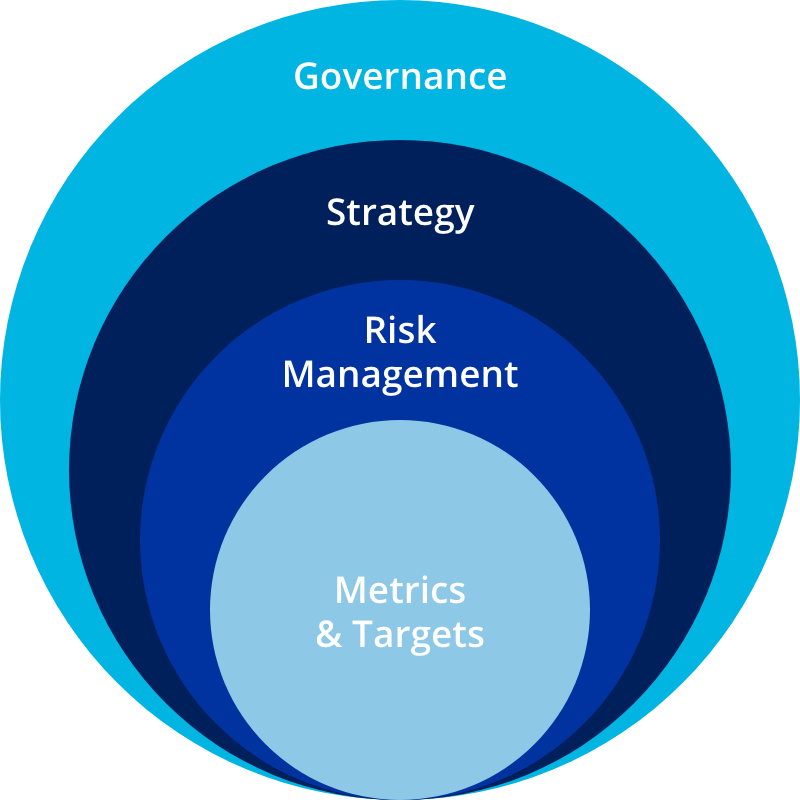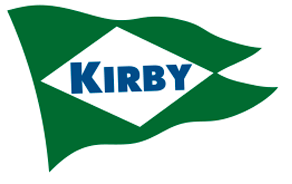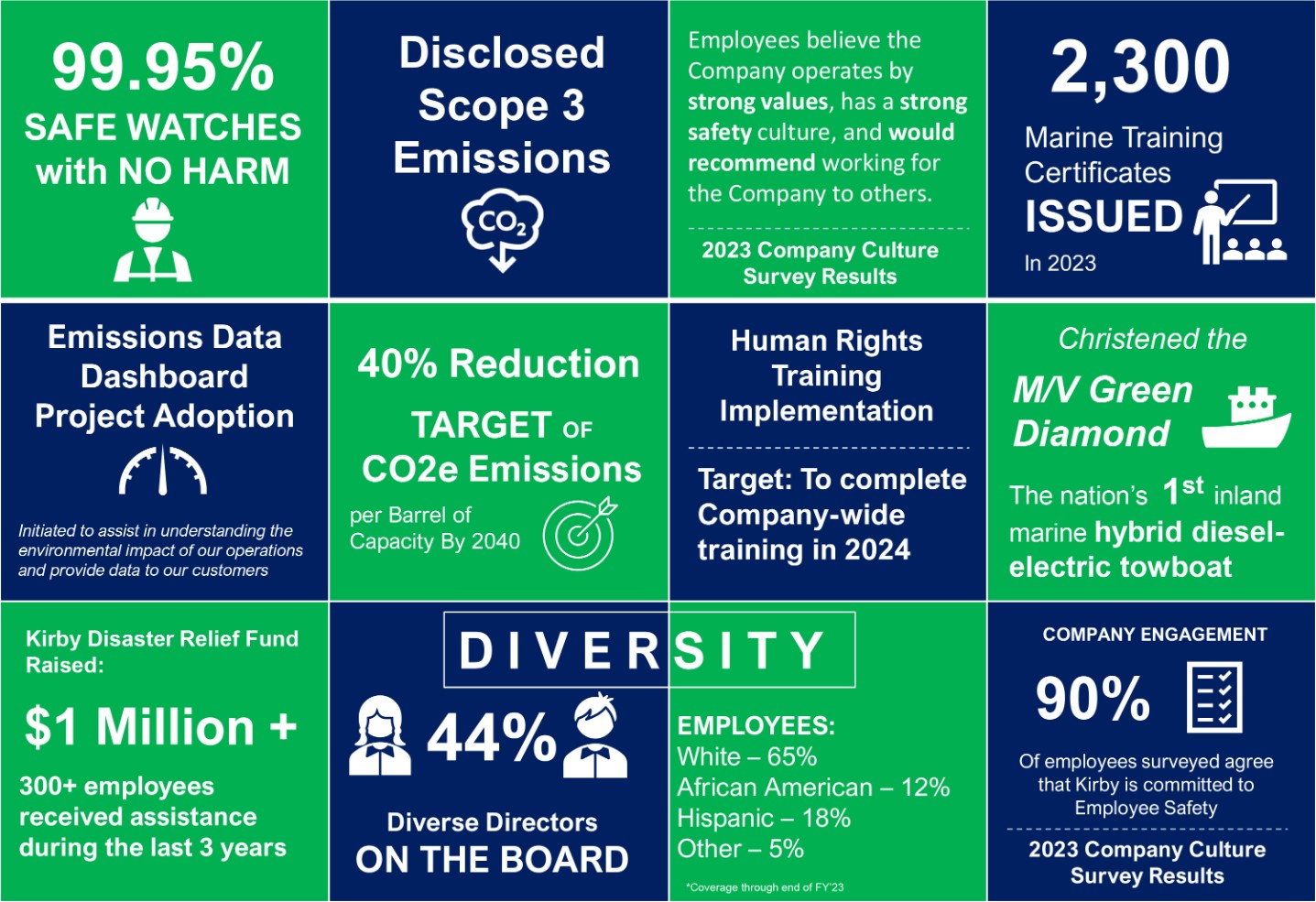Sustainability Overview
Message from CEO David Grzebinski
 “The Kirby Way” defines our core values of Safety, People, Excellence, Community, and Integrity. These core values are the foundation of our sustainability initiatives and strategies. “No Harm to People, No Harm to Equipment and No Harm to the Environment” are the principles that provide the strong foundation for Kirby’s corporate safety culture. Kirby’s products and services are vital to meeting the on-going daily needs and end uses in our modern-day society. It is imperative that this is done in a sustainable and safe manner.
“The Kirby Way” defines our core values of Safety, People, Excellence, Community, and Integrity. These core values are the foundation of our sustainability initiatives and strategies. “No Harm to People, No Harm to Equipment and No Harm to the Environment” are the principles that provide the strong foundation for Kirby’s corporate safety culture. Kirby’s products and services are vital to meeting the on-going daily needs and end uses in our modern-day society. It is imperative that this is done in a sustainable and safe manner.
Our Kirby Marine Transportation segment safely and efficiently moves million tons of cargo of petrochemicals, black oil, refined products, and agricultural liquids annually, and our Distribution & Services segment manufactures environmentally friendly oilfield equipment. Kirby proudly contributes a vital role in the supply chain of countless products that support a better quality of life for people around the world. Thus, it is imperative for Kirby employees to operate safely, responsibly and efficiently. In 2023, Kirby continued to create value for our customers and stockholders all while focusing on its sustainability objectives..
In 2022, Kirby established a new emission reduction target to reduce 40% of carbon emissions per barrel of capacity by 2040. Testing alternative fuels, identifying operational efficiencies, and investing in new technologies were a few of the initiatives the Company has been exploring to accomplish its emission reduction target. In 2021, Kirby approved the plan to build the nation’s first diesel-electric hybrid inland towboat designed to provide fuel efficiencies, emission reductions and reliable transportation of bulk liquid crude oil and refined petroleum products. This project is the product of a Company-wide collaboration as it was designed and constructed inhouse, in partnership with San Jac Marine and Stewart & Stevenson and is operated by Kirby Inland Marine. Overall, the project took over two years, and in August of 2023, Kirby celebrated christening of the ‘M/V Green Diamond’. The vessel is supported by an energy storage system that is expected to achieve up to 80% emissions reductions when compared to towboats of similar size powered with a conventional engine.
Read MoreSustainability Report Highlights
Guiding ESG Frameworks and Standards
Kirby is relying on the following frameworks and standards to guide our ESG journey.







“The Kirby Way”
Safety
Our guiding principle is No Harm to people, the environment, or equipment. Safety is at the core of everything we do and always drives our decision-making.
People
Our people make the difference. We invest in the tools and resources to empower our employees, and we promote a workplace that values mutual respect, knowledge, and teamwork.
Integrity
Do the right thing by having the highest ethical standards while always being transparent and accountable for our actions.
Excellence
Community

Kirby Contributes to a Better Quality of Life Every Day
Kirby’s products and services are vital to the development of common end-products such as those shown above and used by people daily. Our involvement stretches from our marine transportation business, which safely and efficiently moves millions of cargo tons of petrochemicals, refined products, and agricultural liquids annually, to the environmentally friendly oilfield equipment manufactured by Kirby Distribution and Services. We are proud to play a critical role in the supply chain of countless products that create a better quality of life for people around the world.
Stakeholder Engagement and Participation
Blue-Sky Maritime Coalition (BSMC)
–– Kirby is a founding member and serves in leadership positions (Board Member & Treasurer)
– BSMC members recognize the need to address global climate change and are committed to accelerating the transition of waterborne transportation in the United States and Canada toward net zero GHG emissions through development of infrastructure, encouraging innovation, and promoting policies

Climate-related Risks and Opportunities
Kirby’s Marine Transportation Group moves millions of cargo tons of petrochemical, refined, and agricultural products annually. Demand for these products has increased over the years and according to the International Energy Association is expected to continue moving forward. Therefore, Kirby is met with a dual challenge with respect to emissions from transporting said products and climate-related risks and opportunities. Below is a summary of the framework used in Kirby’s report on the Task Force of Climate-Related Disclosures.
Governance
Board oversight
– ESG & Nominating Committee: ESG issues
– Audit Committee: Climate-related risk and opportunities
Management oversight
– Climate-related risk and opportunities
– ESG/Sustainability issues

Risk Management
Our enterprise risk management process, Kirby is performing a scenario analysis of risks and opportunities associated with changing weather patterns that could have significant impact on our operations
– Hurricane scenario
– High water scenario
– Energy technology transition
Strategies with Examples
Transition Risks
– Policy and Legal: Oil and gas regulations changes
– Technology: Transition to low-emissions equipment, energy technology
– Market: Eco-friendly fracking equipment
– Reputation: Cargo spills
Physical Risks
– Acute: Hurricanes
– Climate: Flooding
Target and Metrics
– Kirby Corporation is committed to reducing the negative effects of climate-related risks and developing strategies to capture opportunities
– To address its marine fleet’s CO2e emissions, the Company has established a 40% emissions reduction target per barrel of capacity through 2040
– See the Environmental page for more information

